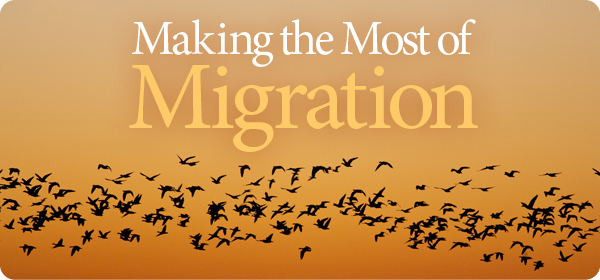
6 Ways to Prepare Your Yard for Fall Migration
Attract migrating birds to your backyard by setting up an environment that mimics how birds naturally live and forage.
1. Understand fall migration.
When fall arrives, a bird's life transitions. Summer was nesting time, during which birds set up territories and raise babies. In fall, they are no longer raising families and most of these territories break down. Some birds flock up with their own kind and use the flock as a winter survival tactic, taking advantage of more eyes to search for food and watch for predators.
Some birds mix together with other bird species in a winter foraging flock. This loose foraging guild travels around, learning each other’s alarm calls to protect from danger. They also learn food foraging techniques from each other, such as searching up or down trees.
2. Attract birds with low-lying landscapes.
Overall, a varied, dynamic landscape that is not completely manicured will help attract birds during the fall. Take a look at your landscape, try to leave some natural roughage. If possible, leave perennials with seeds standing. Many birds, like finches, sparrows and juncos, love to work on seed heads. Coneflowers, black-eyed susan, coreopsis, sunflowers, cosmos, zinnias, and native grasses are some of their favorites. Native bees will also lay eggs inside the hollow plant stems.
Leave the leaves! Leaf litter is a great place for birds to forage for seeds, insects, and worms. The leaves will decompose over time and add nutrients back into your soil.
Put out a few brush piles. It gives birds a place to hide from weather and predators. It also gives them a place to loaf and socialize before and after eating at your feeders. Ground-feeding environments attract birds that avoid elevated food sources. Song sparrows like to feed this way and are just about everywhere in North America.
You can also use seed blends with White Millet. These are wonderful when offered in feeders that are near the ground or in an elevated feeder that allows some millet to be dropped to the ground.
3. Attend to bird feeding stations.
Fall is the perfect time to attend to your bird feeding stations. Take the opportunity to clean and repair your feeders now, because who really wants to care for feeders during winter weather?
Fall is also a great time to move bird feeding stations closer to the house. It will be easier to keep them full during winter’s cold. Plus, regularly moving feeding stations prevents buildup of debris under the feeder, making it healthier for ground-feeding birds.
4. Fresh food now to attract birds later.
As birds come through and decide where to stay, they are more likely to stay if they note a regularly available food source. Even if they are not hitting the food source on a consistent basis in the fall, once the weather turns cooler, they’ll remember where that reliable source is. By keeping food fresh now, even if it’s a small amount, the birds will reward you once the weather turns.
5. There are more food sources beyond seed.
Make sure you have high-quality fresh food and high-energy, high-fat foods. Wild Birds Unlimited seed blends have these qualities. Also, spreadable Bark Butter or Bark Butter Bits are great sources. Bark Butter in any form is a magnet for birds, and there are over 140 species confirmed that enjoy them. Once they try it, birds are all over it. Live or dried mealworms are another option. These foods help captivate migrating birds.
6. Provide a moving water source.
A moving water source is a magnet for birds. If a bird is passing through and they see or hear moving water, they will almost always check it out. They need open water sources for drinking and keeping their feathers maintained for flight and proper insulation as the nights get colder.
Stop by the store and we’ll show you the foods, feeders and other products to help attract migrating birds.

